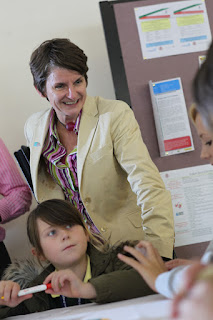With much tal of sport at school, Chair of Sport Wales Professor Laura McAllister talks about the importance of school sport and the work with the education sector.
Professor Laura McAllister, Chair of Sport Wales;
“Working with education on the important role of schools to sport in Wales has been high on our agenda for some time.
“I cannot overestimate the importance of education – it is absolutely crucial if Wales is to witness a significant increase in the numbers of young people playing sport. Schools play a fundamental role in developing and sustaining a child’s love of sport.
“Of course, education is a devolved responsibility in Wales and we have had ongoing discussions with the Welsh Government over how we can create a generation that is hooked on sport for life.
“Along with my colleagues, I have spoken regularly with Welsh Government Ministers with responsibility for sport and education, and I am very encouraged by their views towards sport in school.
“The Education Minister has even gone on record to talk about his commitment for physical literacy to be as important a developmental skill as reading and writing. This is reflected in the Programme for Government and a new task group has been set up to look at the continued development of this work.
“It is important that young people can develop the skills to take part in sport from a very young age and we see our role as supporting this alongside schools, clubs and community leisure venues.
“We have developed vital resources such as Play to Learn, designed to improve physical development and creative movement skills for 3-7 year olds.
“In September, we will be launching a new variation of our Primary School-aged Dragon Sport programme (to Dragon Multi-Skills and Sport) to focus on embedding basic skills - such as agility, balance and co-ordination – that give the essential building blocks, before moving on to playing a specific sport. We want the lasting legacy of these Games to be a generation of children and young people with the competence, confidence and motivation to participate in sport. This will not happen overnight, but through working together with our partners we believe that all children can reap the benefits that participating in sport brings.
“In secondary school, the 5x60 project is in place to complement curricular sport and PE.
“Looking specifically at schools, we see some excellent work being carried out in gyms and on playing fields across the country. But this is often happening in pockets and we must be sure that high quality is the norm and that good practice is shared across the board.
“We need to see every child accessing two hours of high quality PE every week. This needs to be supported by at least three hours of extracurricular or community sport.
“I believe the most important factor in all of this is that of the headteacher. Those that embrace the importance of vibrant school sport and are passionate about it place sport high on the agenda. They ensure that opportunities, designed by the pupils that meet their needs, are provided and that they link with the community and local clubs.
“This must be coupled with teachers who are trained and supported to provide engaging PE sessions within our schools. Sport Wales is a firm believer that greater priority should be given to the training of teachers in this area so that they are up-skilled and confident in the delivery of physical education.
“We need to be ensuring that pupils are engaged with their sporting experience at schools, utilising Young Ambassadors to inspire and support their peers. Young Ambassadors can be at the top of a whole school workforce. Sports leaders and young people delivering activity really motivates their peers, giving them this responsibility is a win-win for us all here development in employment skills and us in having motivating volunteers.
“Last year we undertook the largest survey of school children in Wales. There were some pleasing results, including the sheer number of primary school pupils involved in school sport. But there are challenges as well, including addressing a drop-off by girls when they get into their teens and ensuring that pupils have a voice in their provision.
“How we package sport will be important because we know that many young people love the competitive nature, where some are motivated by more participatory activities. We need to be able to cater for the demand.
“There are also the opportunities through technology, which some schools have been leading the way in using, and the increasing popularity of different versions of sports and new emerging activities – like futsal - that we must all take advantage of.”

No comments:
Post a Comment